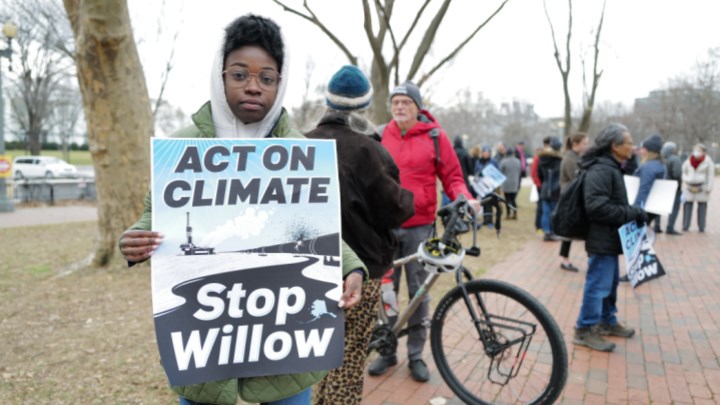US government approves huge Alaska oil and gas development

A CONTROVERSIAL Alaskan oil and gas project has been given final approval by the Biden Administration, on what is described as the largest tract of undisturbed public land in the US, despite promises of ‘no more drilling on federal land” by the US president during his election campaign.
Expected to produce about 180,000 b/d at its peak, and around 576m bbl of oil over 30 years, the scale of ConocoPhillips’ US$8bn Willow project on the remote tundra of Alaska’s northern Arctic coast is vast.
According to a report by the Bureau of Land Management, the project’s infrastructure, which will stray onto private land owned by native communities, will include more than 200 oilwells, a central processing plant, 60 km of roads, 620 km of pipelines, airstrips and a gravel mine within the National Petroleum Reserve in Alaska (NPR-A). The NPR-A is a 5m ha swath of land on Alaska’s North Slope that was set aside a century ago for oil production.
The report details a string of potential environmental impacts including increased noise, and human activity that could lead to the disturbance and displacement of birds, caribou, polar bears, and marine mammals, as well as soil composition changes, decreased albedo, permafrost thawing, habitat loss for fish in certain areas, and wetland composition changes.
The decision to approve the project, which generated one million letters of protest, has been lambasted by environmental groups who argue the project is inconsistent with Biden's pledges to lead on climate action. Along with damning environmental consequences, the project could generate up to 278m t of CO2e over its 30-year lifetime – the equivalent of adding 2m cars to US roads every year.
“It green-lights a carbon bomb, sets back the climate fight and emboldens an industry hell-bent on destroying the planet. It’s wrong on climate and wrong for the country,” said Christy Goldfuss, chief policy impact officer at Natural Resources Defense Council.
That view was also echoed by environmental charity Sierra Club, who said: “It's the wrong move and will be a disaster for wildlife, lands, communities, and our climate."
However not everyone is up in arms about the project. The local Alaska Native village corporation has expressed support, so too have the Inupiat Community of the Arctic Slope and the Alaska Federation of Natives.
Citing crippling gas prices at US$18 a gallon as one of the drivers behind their support, three members of Alaska’s congressional delegation, including newly elected Democrat Mary Peltola, the first Alaska Native elected to Congress, voiced their approving opinion on the matter in a joint op-ed. “We all recognise the need for cleaner energy, but there is a major gap between our capability to generate it and our daily needs. Even those who practice a subsistence lifestyle in Alaska — living primarily off the land and water — rely on boats, snowmachines and ATVs, and those all need fuel,” the opinion piece said.
ConocoPhillips also rallied around the decision saying it will create local investment and thousands of jobs. The firm said it has paid approximately US$120m to the federal government for lease acquisition and rental costs, which it started to acquire during the Clinton-Gore administration.
The project was given the green light during Trump’s presidency, but a federal judge voided the decision, ruling that an earlier environmental review was flawed. However after several rounds of environmental analysis, the Bureau of Land Management has now approved the updated proposal with some modifications to reduce the project size from five drill sites to three.
Biden suspended oil and gas lease sales, and angered many by blocking the Keystone XL pipeline – an extension to an existing pipeline designed to transport tar sands oil between Canada and the US – during his first weeks in office. But the administration has since resumed oil leasing as part of compromises it made in order to win Senator Minchin’s vote and push through its Inflation Reduction Act last year.
That the president’s staunch approach for quickly phasing out fossil fuels appears to have waned, comes as federal data shows the Biden administration has approved nearly 100 more oil and gas drilling leases than Donald Trump had at the same point in his presidency.
Concerns by environmental groups of the US’ inconsistency towards tackling global warming is also highlighted by forecasts from the EIA, which states US oil and gas production is expected to hit record levels this year and next.
Recent Editions
Catch up on the latest news, views and jobs from The Chemical Engineer. Below are the four latest issues. View a wider selection of the archive from within the Magazine section of this site.




